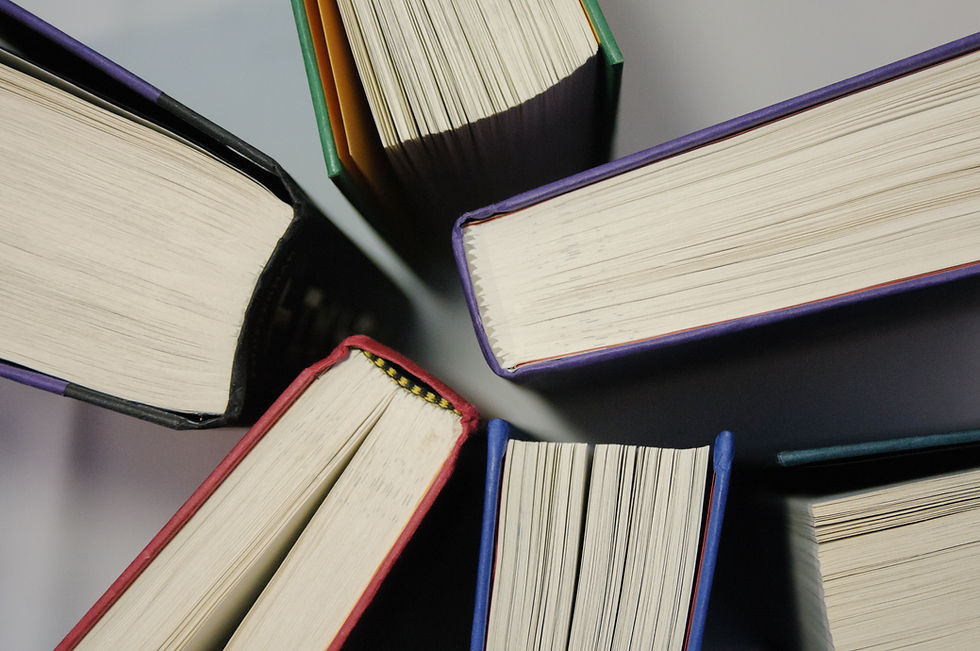Different Realities - Our Reading List
- Bethanie Knapper

- Sep 30, 2021
- 4 min read
In honour of the theme of our second issue, ´Different Realities´, we wanted to explore some of the books throughout history that have discussed and caused us to reflect on reality. A good book can change the way we see the world, in some cases creating other worlds and realities in and of themselves. It can even be argued that reading itself is an act of shifting from one reality to another, be it through fantasy, escapism or even just learning something new. With this in mind, we hope you enjoy a look through the Writeresque bookshelves to see some of the books that have made us think about reality.

Frankenstein - Mary Shelley
A ground-breaking novel often even seen as pioneering science fiction, Frankenstein is a classic for a reason. As much as it is about death and the human need to change the limits of reality and conquer what seems to be impossible, it also feels like a novel about grief, curiosity, morality and a search for connection. It is an interesting and seemingly modern read in a time where we do things every day that would previously be seen as impossible and unimaginable, with Shelley navigating the boundaries of reality and impossibility and the extent to which these should be crossed. Whilst the lines between life and death seem impossible to transcend, the feelings of redefining what is possible and having to accept the consequences seems incredibly familiar.
The End of Everything - Katie Mack
A book that explains physics in a way that unpicks the fabric of the world around us, from the very beginning of the universe and the Big Bang to theories about how the world will end. Reality seems so much more than what we can see and understand, orientating ourselves in a vast history of the cosmos. Subject matter like the end of the universe and the innermost workings of our planet and its surrounding galaxies can feel strange to a layperson; their intricacies can seem both distant and alien and terrifyingly inevitable. Mack, however, makes this informative, poetic and philosophical, whilst being remarkably funny. Even with such complex content that deconstructs physics and the workings of the universe, Mack makes this book incredibly reassuring and even soothing, truly showing the magic and uniqueness of our world.
Automated Alice - Jeff Noon
Based on one of the classic books that explores alternate reality, Alice in this novel heads to the Manchester of the future, navigating a quest in a surrealistic world with a very 90s flair. Noon’s incredible – sometimes silly – wordplay is reminiscent of the book he’s inspired by, with his Alice not only traversing a new world but parallel realities and interpretations of history and fiction, even encountering new versions of herself in the form of different Alices. A twist on a classic that has all of the charm of the original whilst being refreshing, it’s a witty and surrealist delve into the subjectivity of reality.
Lolita - Vladimir Nabokov
Nabokov’s most famous and notorious work remains complex and controversial to this day, with many readers feeling a bitter taste at its difficult subject matter and a narrator it’s impossible to feel sympathetic for. But arguably how the novel approaches the subject of reality is what makes it so affecting. Part of what makes Humbert such a troubling villain is his manipulation of facts and truth and his reconstruction of reality. The story, told entirely from his perspective and point of view shapeshifts and changes at any point that could see him as responsible for his unforgivable actions. His constantly changing perspective makes him impossible to understand; he is just as unreadable at the end of the novel as he is at the beginning, a fact that makes him seem even more dangerous. You get the sense throughout the book that if he could be understood, he could be stopped. Lolita shows how reality can be used as a weapon and a tool of the powerful to manipulate, and the extent of how stories can be moulded and shaped to suit those telling them. It could be argued that it is Humbert’s control over and manipulation of what is real that, depending on your personal perspective, makes the novel sickening, clever, or both.
Freshwater - Akwaeke Emezi
Akwaeke Emezi’s debut novel is unlike any other. Through an exploration of mental health, spirituality, mysticism, cultural history and identity, reality is seen as something that can both be what destroys and what heals you. One of the most poignant aspects of the book is how mental health struggles can impact, change and disorientate your sense of reality with Ada’s internal life remaining rich and complex. Different aspects of Ada’s personality tell the story, each one adding new layers and recounting different parts of their life. Whilst this causes immense pain, suffering, and confusion throughout the book that is written so movingly, the beauty of Freshwater is Ada’s healing, piecing together and accepting of a unique identity that transcends expectations without compromise, embraces every unique part and, in Emezi’s words, contains multitudes.




Comments